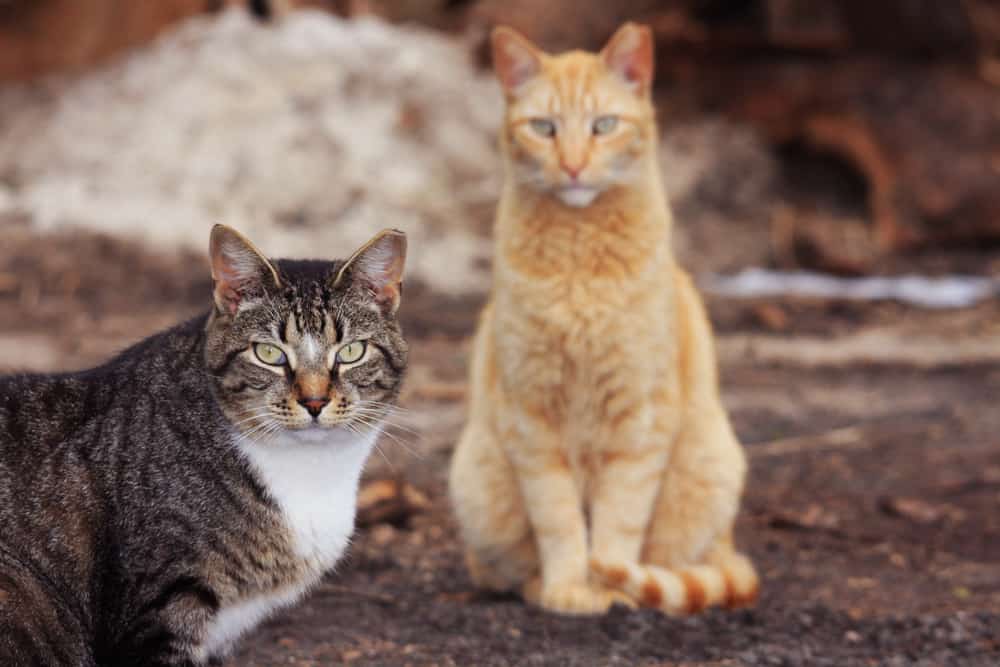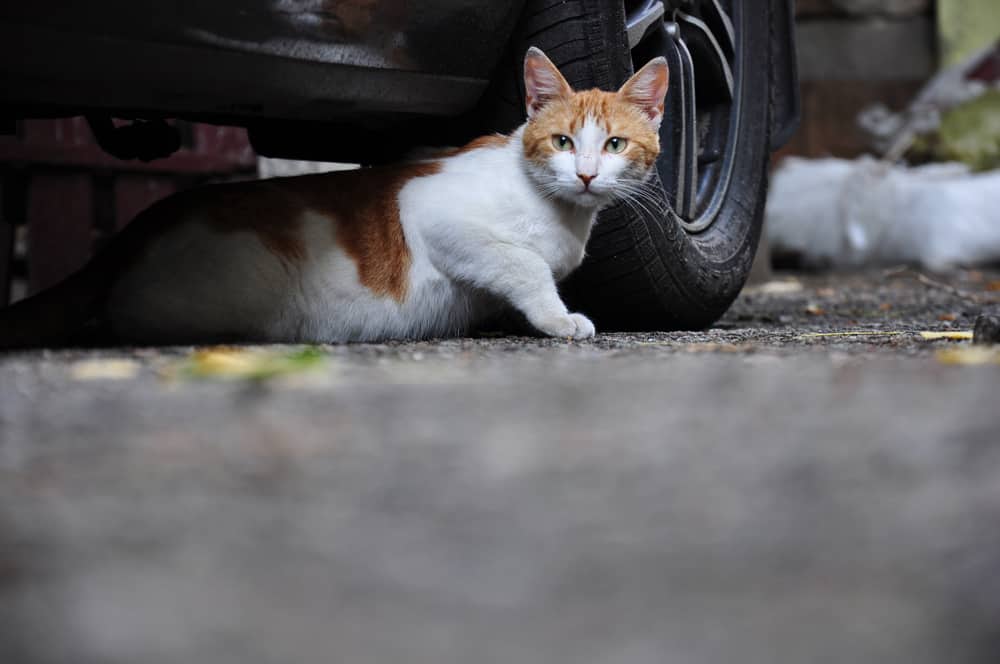Sometimes we wonder if one day our cat escapes and somehow has no human contact for a while, will it return back into a feral cat?
Or maybe, if a cat has been so neglected, can they start to begin to fear and distrust humans?
Are there conditions that, when met, can make a domestic house cat become feral? If a domestic cat is either neglected, lost, or even abused, it can develop feral-like qualities, but a previously domesticated and socialized cat can never become fully feral. They become strays and then maybe, in some situations can develop feral-like qualities.
This is good because a cat that is lost, abused, or neglected can eventually find peace and happiness again in loving families. If they have learned to live with humans when they were young, they will quickly revert back to that domestic state as well. Cats, while known to dislike change and stressors, can quickly adapt again if the conditions are right.
What Is A Feral Cat?
A feral cat is a cat that has had no human interaction in their lives. As such, they will exhibit aggression and/or fear whenever there is a human nearby. They are used to fending for themselves and will use their teeth or claws without much provocation. So whenever you approach a cat on the street, being cautious is a good idea.

So according to this definition of a feral cat, a cat that is lost or abandoned, cannot be a feral cat because they have had some sort of human interaction once before. Whether good or bad, these cats are somewhat responsive to most human interactions. This makes a big difference.
So What Does A Domestic Cat Become?
They become strays first. Strays are basically cats that use to have contact with humans and are in some ways, socialized to humans. They were either once pets and were lost or abandoned cats by their owners.
As these strays continue to live outside of a home, there are 3 options of what might happen:
First option. They become accustomed to life outside, and in combination with some interaction with humans, they are in a sort of comfortable limbo where they stay strays for a long period of time, living off of whatever humans give them or trash that’s nearby.
The second option. Some strays might be lucky enough to be rescued, re-socialized, and allowed another chance at becoming a member of a loving family. This is the ideal situation for strays.
Third, depending on their lives before they were strays and how much they were neglected/abused, they can become increasingly driven further from any human interaction. At this point, they could gain more feral tendencies as they learn to forget their socialization. However, it usually never gets to this point as strays usually are poorly unequipped to fend for themselves, and unfortunately, they don’t live very long lives without some external help.

Of course, we all hope that strays get the second option and receive an extra chance at living long and happy lives which is why I recommend that one adopt cats rather than buy them from any pet shop that might be available.
A long time ago, one of the cats I was fostering at the time escaped my previous apartment. To this day I have no idea how it happened but since then I’ve been extra careful to double-check all the cats whenever I leave my place. Anyways, I was lucky, he was found in a nearby neighborhood apartment complex a week later.
He came back, fatter, and chubbier than usual. We checked him at the vet and he came back with a healthy report. We were of course relieved but we were curious how his life was outside for the first time in his life for a week. Obviously, it would have been terrifying for him, but we were wondering how he was living because we assumed he would’ve had a difficult time finding food and water. So, we asked the lady that found him. She mentioned that he was extremely friendly and approached her first.
She had mentioned that she thought he was so cute and friendly that she let him into her place multiple times until she finally took him in. This was when she found the missing cat notice and contacted us (I felt super guilty). It really gave some insight into how strays live in the city. Even without food and water, they were still able to win the hearts of cat people.
Stray VS Feral Cats
So what are the main differences between a stray and a feral cat? What are some of their common traits?
| Stray Cat | Feral Cat |
|---|---|
| Stray cats are sometimes curious and will approach or even try to respond to humans. | Most feral cats will not tolerate any human contact. Even getting too close will have them darting away. |
Stray cats in general, respond to food and toys quite well. | Feral cats are incredibly careful and observant. Even if you offer them food, most of the time they won’t even react. The slightest sound will send them running into cover. |
| Stray cats can be found at any point of the day. | They rarely meow or make noise to not draw any attention to themselves. They are most active during dawn and dusk so seeing them randomly throughout the day is very unlikely. |
So in summary, we see that the differences are quite significant between a stray and a feral even though they both live outside, wherever outside might be.
In the city, it’s more common for cats to be strays and living as strays because there is a much higher chance of a cat having some interactions with humans.
In a more rural area, it’s more likely for cats outside to be feral, as the chances to run into a human is much less.
Is It Possible to Socialize Strays/Ferals Back to Domestic Cats?
From the chart above, we know that strays that have had experience with humans before might respond to certain things. As such, they can eventually be socialized back into domestic cats that can be kept in the home.
For cats that have had a traumatizing past with humans, this process of socialization will take longer as they would need to regain their trust and repair their feelings towards us. The same goes for feral cats. Because of their lack of experience with humans, in general, will have a lack of response towards whatever we do.
Associations play a big role in the socialization and re-socialization of cats. We want to re-train them into associating humans with positive feelings and one of the most important tools for this is food. Cats are food motivated and they have a good reason for doing so. As a result, they create strong positive feelings towards food and whatever is around them when the food is present.
As they begin to trust us more, we can escalate this interaction with activities using toys, cat furniture, and allowing them to explore more of their surroundings.
At the end of socialization, these cats are ready to be touched, hugged, and played with all without showing aggression or fear.
My Experience Socializing A Feral Kitten
My youngest member of my family, Loki, I’m fairly sure that he was a feral kitten. I adopted him from the local vet and he said that he found this kitten away from his mother for a long period of time so they rescued him. He was in pretty bad condition.
Anyways, long story short, when I adopted him and took him back to my apartment, he was incredibly scared at first but because he was a kitten, he was very curious about everything that was around him.
He took a long time to be socialized compared to my other cats (even longer than my Bengal cat!) but because he was very young, he took to things more quickly had he been an older cat. So it took a lot of effort but he’s very well adjusted to apartment living now.
He also loved to bite. So those people that are looking for ways to stop their cat from biting, read my detailed guide! Now, Loki rarely bites and asks often to be touched and pet!
Conclusion
In summary, the main thing to take away is that ‘feral’ is defined by a cat’s behaviors and not where it was found outside. If a cat that was once domesticated finds itself outside becomes a stray, not a feral cat.
However, if it is a stray, it is quite a bit easier to re-socialize the cat for rehoming with the correct methods and tools, rather than socializing a stray because of the stray’s past experience with humans.

Our 12 yo house cat went out one night ( we live in the country) and failed to return. All attempts to find her failed so I assumed the worst. About 3 weeks later she has come back to our barn but she will not come to me or allow me to approach her. We have another cat that has always lived in the barn which I feed daily so our once house cat has food, water and shelter. My question, why won’t she come to me or come back inside the house?
Cats that have been away for a while can sometimes be wary of even the people that took care of them in the past! So be patient with her and take it slow. Try to get closer with food/toys every day, try to lure her nearer and nearer to the house with the goal of getting inside the house. Hopefully, when she realizes that there’s more food and safety inside, she’ll start coming around!
This week I started trying to catch a very affectionate stray abandoned by her owner a few months ago. I’ve been feeding her for about a week once I was sure she was abandoned. A few days ago I was holding her and I tried to put her in a carrier to be examined by my vet. She became very frightened and scratched her way out of my grip. Now she is wary and will wait to eat if she sees me or my family. Do you have thoughts on wether or not I will be able to regain her trust ? I would like to take her into my home with our other cats. They are used to seeing each other through the window so I don’t expect any long-term issues with them sharing a home. Thank you.
Thanks for your comment! You’ll definitely have another chance to regain her trust. However, it will be on the cat’s time and terms. If you take it slow and use basic socialization techniques – she’ll eventually start to let down her guard.
When a cat is wary, sometimes you want to do the opposite of what you feel like you should do. Rather than putting too much focus on them – ignore them, at least for a couple of days. Let them get out of their funk. This article might help: How to Get a Cat to Like or Trust You Again.
I have a cat that never liked anyone but my mom who recently passed. She hisses and meows at me. She was fine at using her litter box then she started urinating outside her box. She has never been outside. Can I pit her outside safely or what a can help her to stop urinating outside the litter box. I feel I am the only person in the world that loves her but I think she is suffering separation anxiety or something. Can you PLEASE help?
Hi! Your cat eliminating outside the litter box is a difficult situation, I understand. Check my article here for a good place to start diagnosing the issue!
One of our cats went missing about 6 months ago, only 1 month after us moving across the country. We’ve been searching and doing everything possible to find him. Yesterday, I went to a local shelter and there is one there that I am about 90% sure is him, but they have him in a feral box, meaning he was not friendly when they picked him up. We’re waiting on vet confirmation of sex and age but it looks just like him, just very very skinny. Any advise on how to socialize him once bringing him back home? We have other pets too. I’m willing to try whatever it takes to get our Marmalade back to himself again for our daughter.
Take it slow and consistent with your interactions! You’ll be glad to know that a once socialized cat will be able to readapt quickly to home life. This article might help!
Link: https://monsieurtn.com/cat-wont-let-me-pet-or-touch/
My very much loved and well fed cat who we had for 10 years went out in October 2021 and didn’t return. I was determined to find her. We live in a rural setting in a neighborhood but house lots have lots of acreage and trees. I put out humane traps and caught her. She had been out for 3 weeks. She stayed in the house for a few days but wanted nothing to do with us and only wanted out. She broke a screen and jumped out the window. It’s been very upsetting to not know what happened to her. We got her as a kitten where the people we got her from said she had been in the woods when they found her. She has always liked to be outside but would stay in with us most of the time. Nothing had changed at home. I have hoped that when it got cold she would return but it hasn’t happened.
I would love to know the answer to this. Our 2 year cat went out 10 days ago and hasn’t returned 😪
Our 5 year old cat has always been an outdoorsy kind of cat since we found her. We have 2 other cats who get along just fine with eachother, but we recently acquired another cat who’s gotten quite aggressive with our cat duchess ( who’s 5 yrs ) and kept chasing her off causing problems not just for us but for duchess as well. The one day we let her out she didn’t come back home for weeks and naturally we assumed that she had either passed or got taken to a shelter, either way it was hard. Surprisingly she wasn’t dead or had been taken away since we were able to see her around the neighborhood a few days ago, but we’re having a hard time convincing her to come back inside since she won’t go near the house or go within a few feet close to us. So I guess my question is what would be the solution to getting her back inside? Or would it be necessary to use a catch and release cage if it got bad?
We just got a 7 month old cat who was from a large family they were giving him away due to him constantly hiding from them and only coming out at night. We do not know how long he was living like that but was wondering if he maybe started turning feral and how should we go about getting him socialized.